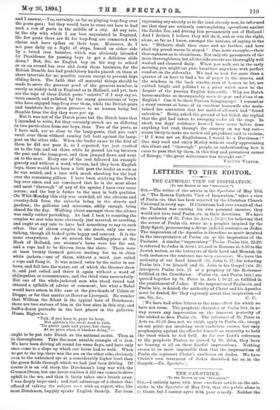LETTERS TO THE EDITOR.
THE CATHOLIC VIEW OF INSPIRATION.
[To THE EDITOR OF THE "SPECTATOR.'] Sin,—The writer of the article in the Spectator of May 19th on *" The Roman Catholic View of Inspiration," takes a view of Psalm cix. that has been rejected by the Christian Church Universal in every age. If Christians had ever imagined that the Psalmist was cursing his own personal enemies, they would not have used Psalm cix. in their devotions. We have the authority of St. Peter (in Acts i. 16-20) for believing that the writer of Psalm cix. wrote as a prophet inspired by the Holy Spirit, pronouncing a divine judicial sentence on Judas. The inspiration of the Apostles is therefore as much involved in the interpretation of Psalm cix. as the inspiration of the Psalmist. A similar "imprecatory Psalm (Psalm lxix. 22-29) is referred to Judas in Acts i. 20, and in Romans xi. 9-10 to the Jewish nation, as the betrayers of their Lord and Messiah (in both instances the sentence has been executed). We have the authority of our Lord himself (St. John ii. 17) for referring Psalm lxix. 9 to himself, and St. John in his Gospel (xix. 28) interprets Psalm lxix. 21 as a prophecy of the Redeemer fulfilled at the Crucifixion. (Psalm cix. and Psalm lxix.) are quoted together by St. Peter in Acts i. 16-21. as fulfilled in the punishment of Judas. If the inspiration of Psalm cix. and Psalm lxix. is denied, the authority of Christ and his Apostles must be denied, for they expressly assert that inspiration.—I [We have had other letters to the same effect for which we have not room. The prophetic character of Psalm lair. in no way covers any imprecation on the innocent posterity of the wicked as does Psalm cis. The reference of St. Peter in Acts xx. 16-20 does not, we think, apply to Psalm cix., except on one point not involving such vindictive curses, but only prophesying against the offender himself as unworthy to hold the trust which he had held. As for our Lord's reference to the prophetic Psalms as quoted by St. John, they have no bearing at all on these fearful imprecations. Nothing seems to us more impossible than that the imprecations of Psalm cix. represent Christ's anathema on Judas. We have Christ's own treatment of Judas described for us in the Gospels.—En. Spectator.]


































 Previous page
Previous page